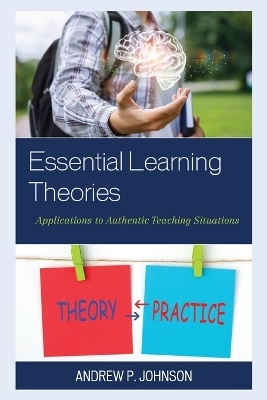
Essential Learning Theories
Rowman & Littlefield (Verlag)
978-1-4758-5270-7 (ISBN)
Research-based theories provide the basis for good decision-making in education. As well, teacher effectiveness and student learning are enhanced when research-based theories are used to design curriculum and daily lessons. This book examines human learning in the context of four types of research-based learning theories: neurological learning theories, behavioral learning theories, cognitive learning theories, and transformative learning theories. With each theory, the basic elements are described along with specific classroom applications. The writing style makes these concepts readily accessible to readers of all levels of experience and expertise.
This book is appropriate for preservice teachers who are seeking to comprehend the basic ideas behind these theories. It is appropriate for practicing teachers who want to understand and apply these theories at increasingly higher levels. It is also appropriate for decision-makers or anybody else who wants to understand human learning and educational processes.
This book ends with a description of lesson planning that is set in the various theoretical contexts and includes a guide for defining an educational philosophy.
Dr. Andrew Johnson is Professor of Literacy and Distinguished Faculty Scholar at Minnesota State University, Mankato. He has written 12 books and published over 41 articles related to literacy, learning, and the human condition.
Dedication
Preface
PART I. BACKGROUND
Chapter 1: Theories, Learning, and Learning to Teach
PART II. NEUROLOGICAL LEARNING THEORY
Chapter 2: Neurological Learning Theory
Chapter 3: Applying Neurological Learning Theory
PART III. BEHAVIORAL LEARNING THEORIES
Chapter 4: Behaviorism - Classical Conditioning
Chapter 5: Behaviorism - Operant Conditioning
Chapter 6: Applying Behave Modification In The Classroom
Chapter 7: Social Cognitive Learning Theory
PART IV. COGNITIVE LEARNING THEORIES
Chapter 8: Piaget’s Learning Theory
Chapter 9: Vygotsky’s Learning Theory
Chapter 10: The Information Processing Model
Chapter 11: Memory
Chapter 12: Learning
Chapter 13: Constructivist Learning Theory
Chapter 14: The Learning Theory of Jerome Bruner
Chapter 15: Ausubel’s Theory of Meaningful Verbal Learning
PART V. TRANSFORMATIVE LEARNING THEORIES
Chapter 16: Humanistic Learning Theory
Chapter 17: Applying Humanistic Learning Theory in the Classroom
Chapter 18: Holistic Learning Theory
Chapter 19: Applying Holistic Learning Theory in the Classroom
PART VI. ALGORITHMIC VIEWS OF TEACHING
Chapter 20: Planning for Learning
Chapter 21: The Danielson Framework
PART VII. END MATERIAL
Chapter 22: Defining Teaching
Chapter 23: DEFINING YOUR EDUCATIONAL PHILOSOPHY
| Erscheinungsdatum | 23.10.2019 |
|---|---|
| Verlagsort | Lanham, MD |
| Sprache | englisch |
| Maße | 154 x 217 mm |
| Gewicht | 290 g |
| Themenwelt | Geisteswissenschaften ► Psychologie ► Allgemeine Psychologie |
| Geisteswissenschaften ► Psychologie ► Verhaltenstherapie | |
| Sozialwissenschaften ► Pädagogik | |
| ISBN-10 | 1-4758-5270-3 / 1475852703 |
| ISBN-13 | 978-1-4758-5270-7 / 9781475852707 |
| Zustand | Neuware |
| Haben Sie eine Frage zum Produkt? |
aus dem Bereich


